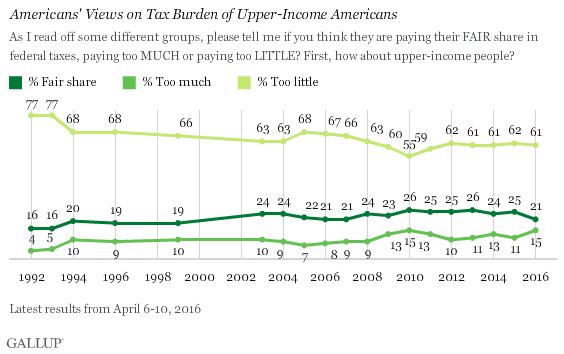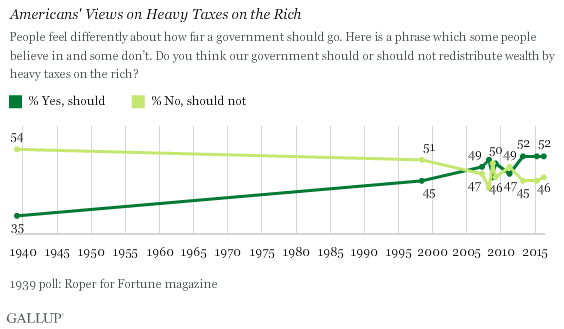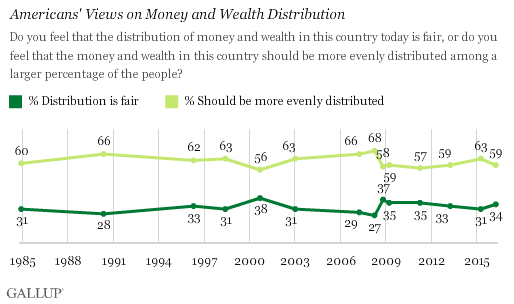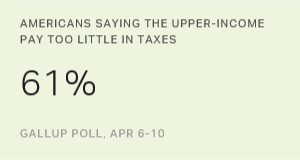Story Highlights
- Americans say money and wealth should be more evenly distributed
- Belief that upper-income pay too little in taxes has been evident for 25 years
- Slight majority favoring heavy taxes on rich is unchanged over last three years
PRINCETON, N.J. -- Six in 10 Americans continue to believe that upper-income Americans pay too little in taxes. This attitude has been steady over the past five years, but is lower than in the early 1990s, when as many as 77% said those with higher incomes paid too little in taxes.

The latest update comes from Gallup's April 6-10 Economy and Personal Finance survey -- conducted during a presidential election year in which taxes have been a major area of focus for the candidates. In particular, Democratic presidential candidate Bernie Sanders has made the reduction of inequality the central motif of his campaign, saying, "The issue of wealth and income inequality is the great moral issue of our time, it is the great economic issue of our time, and it is the great political issue of our time." He has called for "higher income tax rates for the richest Americans." His Democratic opponent, Hillary Clinton, also has called for the need to "reform our tax code so the wealthiest pay their fair share."
Republicans, in contrast, have called for simplified tax plans, which will end up reducing the income taxes all Americans pay. Ted Cruz says that under his tax plan, "All income groups will see a double-digit increase in after-tax income." Donald Trump's plan would simplify the tax code into fewer tax brackets. Although it would reduce or eliminate "most deductions and loopholes available to the very rich," the rich likely would pay less in taxes because upper-income taxpayers under Trump's plan would have a lower tax rate.
The Democratic presidential candidates are the most in sync with overall public opinion on the issue of taxing the rich, given the significant majority who say upper-income Americans pay too little in taxes.
Americans' attitudes on whether upper-income Americans pay too little in taxes are split along political lines. Three-quarters of Democrats say the rich pay too little, compared with less than half of Republicans. Independents mirror the national average. Those with an annual income of at least $75,000 per year, Gallup's highest income category for this analysis, have views that are broadly similar to those earning lower incomes.
| Fair share% | Too much% | Too little% | |||||||||||||||||||||||||||||||||||||||||||||||||||||||||||||||||||||||||||||||||||||||||||||||||
|---|---|---|---|---|---|---|---|---|---|---|---|---|---|---|---|---|---|---|---|---|---|---|---|---|---|---|---|---|---|---|---|---|---|---|---|---|---|---|---|---|---|---|---|---|---|---|---|---|---|---|---|---|---|---|---|---|---|---|---|---|---|---|---|---|---|---|---|---|---|---|---|---|---|---|---|---|---|---|---|---|---|---|---|---|---|---|---|---|---|---|---|---|---|---|---|---|---|---|---|
| National adults | 21 | 15 | 61 | ||||||||||||||||||||||||||||||||||||||||||||||||||||||||||||||||||||||||||||||||||||||||||||||||
| Democrats | 14 | 9 | 75 | ||||||||||||||||||||||||||||||||||||||||||||||||||||||||||||||||||||||||||||||||||||||||||||||||
| Independents | 18 | 16 | 62 | ||||||||||||||||||||||||||||||||||||||||||||||||||||||||||||||||||||||||||||||||||||||||||||||||
| Republicans | 32 | 20 | 45 | ||||||||||||||||||||||||||||||||||||||||||||||||||||||||||||||||||||||||||||||||||||||||||||||||
| Conservatives | 30 | 20 | 46 | ||||||||||||||||||||||||||||||||||||||||||||||||||||||||||||||||||||||||||||||||||||||||||||||||
| Moderates | 20 | 11 | 67 | ||||||||||||||||||||||||||||||||||||||||||||||||||||||||||||||||||||||||||||||||||||||||||||||||
| Liberals | 10 | 12 | 76 | ||||||||||||||||||||||||||||||||||||||||||||||||||||||||||||||||||||||||||||||||||||||||||||||||
| Under $30,000 | 15 | 19 | 63 | ||||||||||||||||||||||||||||||||||||||||||||||||||||||||||||||||||||||||||||||||||||||||||||||||
| $30,000 to $74,999 | 21 | 11 | 64 | ||||||||||||||||||||||||||||||||||||||||||||||||||||||||||||||||||||||||||||||||||||||||||||||||
| $75,000+ | 26 | 16 | 57 | ||||||||||||||||||||||||||||||||||||||||||||||||||||||||||||||||||||||||||||||||||||||||||||||||
| April 6-10, 2016 | |||||||||||||||||||||||||||||||||||||||||||||||||||||||||||||||||||||||||||||||||||||||||||||||||||
| Gallup | |||||||||||||||||||||||||||||||||||||||||||||||||||||||||||||||||||||||||||||||||||||||||||||||||||
Slightly More Than Half Agree With the Idea of Heavy Taxes on the Rich
A separate 优蜜传媒trend question addressing the issue of taxes paid by the well-to-do finds that a slight majority of Americans agree with the proposition that the government should redistribute wealth by "heavy taxes on the rich." Fortune Magazine first asked this question in the late 1930s, during the Depression, and at that point only about a third agreed. When 优蜜传媒updated the question in 1998, 45% agreed. Although the exact figures have fluctuated since, public opinion has been about evenly divided. Most recently, in 2013, 2015 and this year, 52% say the government should redistribute wealth by taxing the rich.

Views on heavily taxing the rich to redistribute wealth are strongly related to political orientation, with a huge gap between Republicans (22% of whom agree with the idea) and Democrats (80%), and a similar gap between conservatives and liberals. As household income rises, support for this idea drops, with those making at least $75,000 per year rejecting the idea of heavy taxes on the rich by a 59% to 40% margin. Young people, who tend to skew more Democratic in orientation, are most likely of the age groups o favor the idea.
| Yes, redistribute by heavy taxes on rich% | No, should not redistribute wealth% | Don't know/ Refused% | |||||||||||||||||||||||||||||||||||||||||||||||||||||||||||||||||||||||||||||||||||||||||||||||||
|---|---|---|---|---|---|---|---|---|---|---|---|---|---|---|---|---|---|---|---|---|---|---|---|---|---|---|---|---|---|---|---|---|---|---|---|---|---|---|---|---|---|---|---|---|---|---|---|---|---|---|---|---|---|---|---|---|---|---|---|---|---|---|---|---|---|---|---|---|---|---|---|---|---|---|---|---|---|---|---|---|---|---|---|---|---|---|---|---|---|---|---|---|---|---|---|---|---|---|---|
| National adults | 52 | 46 | 2 | ||||||||||||||||||||||||||||||||||||||||||||||||||||||||||||||||||||||||||||||||||||||||||||||||
| Democrats | 80 | 19 | 2 | ||||||||||||||||||||||||||||||||||||||||||||||||||||||||||||||||||||||||||||||||||||||||||||||||
| Independents | 50 | 47 | 3 | ||||||||||||||||||||||||||||||||||||||||||||||||||||||||||||||||||||||||||||||||||||||||||||||||
| Republicans | 22 | 76 | 1 | ||||||||||||||||||||||||||||||||||||||||||||||||||||||||||||||||||||||||||||||||||||||||||||||||
| Conservatives | 26 | 71 | 3 | ||||||||||||||||||||||||||||||||||||||||||||||||||||||||||||||||||||||||||||||||||||||||||||||||
| Moderates | 57 | 42 | 1 | ||||||||||||||||||||||||||||||||||||||||||||||||||||||||||||||||||||||||||||||||||||||||||||||||
| Liberals | 77 | 21 | 2 | ||||||||||||||||||||||||||||||||||||||||||||||||||||||||||||||||||||||||||||||||||||||||||||||||
| Under $30,000 | 61 | 35 | 3 | ||||||||||||||||||||||||||||||||||||||||||||||||||||||||||||||||||||||||||||||||||||||||||||||||
| $30,000 to $74,999 | 57 | 41 | 2 | ||||||||||||||||||||||||||||||||||||||||||||||||||||||||||||||||||||||||||||||||||||||||||||||||
| $75,000+ | 40 | 59 | 1 | ||||||||||||||||||||||||||||||||||||||||||||||||||||||||||||||||||||||||||||||||||||||||||||||||
| April 6-10, 2016 | |||||||||||||||||||||||||||||||||||||||||||||||||||||||||||||||||||||||||||||||||||||||||||||||||||
| Gallup | |||||||||||||||||||||||||||||||||||||||||||||||||||||||||||||||||||||||||||||||||||||||||||||||||||
Americans Generally Favor More Equal Distribution
A clear majority of Americans agree that money and wealth in the U.S. should be more evenly distributed among a larger percentage of people, as has been true since 优蜜传媒first asked this question in 1984. The percentage agreeing was generally in the 60% range from 1984 through April 2008 and then dropped slightly in the fall of 2008 just before Barack Obama won the presidential election. The current 59% agreement is right at the average of what 优蜜传媒has found since 2009.

Implications
Americans are generally on board -- as they consistently have been in recent decades -- with the concept that wealth and income should be distributed more equally in the U.S. Americans also tend to agree that upper-income Americans pay too little in taxes and that the rich should be more heavily taxed in order to achieve a more even distribution of wealth.
These attitudes are divided along partisan lines, with wide gaps in opinion between Republicans and Democrats, reflecting the starkly different positions of the two parties' presidential candidates on this issue.
Sanders has been most focused on the issue of income inequality in his campaign, and his position clearly strikes a highly responsive chord with his own partisans, although Democrats interviewed in this survey who support Clinton for their party's nomination are little different on these measures from those who support Sanders. Cruz and Trump may find a similarly responsive chord among their partisans for their "lower all taxes" positions, with again little difference between Republicans who support one or the other for their party's nomination.
Overall, the Democrats continue to have a more resonant position than Republicans with the general public on the use of taxes to help redistribute income and wealth. shows, however, that Americans have become less likely to say the amount they personally pay in taxes is fair, and the Republican candidates' calls for lowering taxes in general may be more in sync with the public's views.
Inequality does not show up as an extremely high priority when Americans are about campaign issues, and relatively few Americans inequality or taxes more generally as the most important problem facing the nation today.
Historical data are available in .
Survey Methods
Results for this 优蜜传媒poll are based on telephone interviews conducted April 6-10, 2016, with a random sample of 1,015 adults, aged 18 and older, living in all 50 U.S. states and the District of Columbia. For results based on the total sample of national adults, the margin of sampling error is ±4 percentage points at the 95% confidence level. All reported margins of sampling error include computed design effects for weighting.
Each sample of national adults includes a minimum quota of 60% cellphone respondents and 40% landline respondents, with additional minimum quotas by time zone within region. Landline and cellular telephone numbers are selected using random-digit-dial methods.
View survey methodology, complete question responses and trends.
Learn more about how the works.
